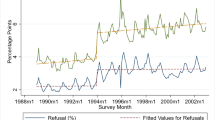Abstract
The hold period between the initial refusal and the follow-up conversion attempt may be used as a strategic tool to improve conversion rates. We argue that longer hold periods result in better conversion rates, particularly among hard-to-convert refusals. In this article we will first investigate to what extend and in which manner survey authorities exert this elapsed time as an active survey instrument. Contact sheet data show that different national survey coordinators deploy different strategies with regard to this hold period. In the Netherlands, intentional survey tactics can be disentangled, whereas Swiss contact data show that the length of the hold period is a mere result other fieldwork conditions. Actual conversion success seems to be consistently dependent upon the hold period between the initial refusal and the follow-up contact.
Similar content being viewed by others
References
Biemer P., Lyberg L.: Introduction to Survey Quality. Wiley, New York (2003)
Billiet J., Philippens M., Fitzgerald R., Stoop I.: Estimation of response bias in the European Social Survey: using information from reluctant respondents in round one. J. Off. Stat. 23(2), 135–162 (2007)
Billiet J., Pleysier S.: Response Based Quality Assessment in the ESS—Round 2. An update for 26 countries. Centre for Sociological Research, Leuven (2007)
Campanelli P., O’Muircheartaigh C.: Interviewers, interviewer continuity, and panel survey nonresponse. Qual. Quant. 33, 59–76 (1999)
Edwards, S., Martin, D., DiSogra, C., Grant, D.: Altering the hold period for refusal conversion cases in an RDD survey. Proceedings of the Survey Research Methods Section, ASA (2004)
Fuse K., Xie D.: A successful conversion or double refusal: a study of the process of refusal conversion in telephone survey research. The Social Science Journal 44, 434–446 (2007)
Groves R., Couper M.: Nonresponse in Household Interview Surveys. Wiley, New York (1998)
Groves R., Singer E., Corning A.D., Bowers A.: A laboratory approach to measuring the effects on survey participation of interview length, incentives, differential incentives, and refusal conversion. J. Off. Stat. 5(2), 251–268 (1999)
Kropf, M.E., Scheib, J., Blair, J.: The effect of alternative incentives on cooperation and refusal conversion in a telephone survey. Proceedings of the American Association for Public Opinion Research Meeting (1999)
Loosveldt G., Carton A., Billiet J.: Assessment of survey data quality: a pragmatic approach focused on interviewer tasks. Int. J. Mark. Res. 46(1), 65–82 (2004)
Pickery, J.: Applications of multilevel analysis in survey data quality research. Random coefficient models for respondent and interviewer effects. Dissertation, Katholieke Universiteit Leuven (2000)
Pickery J., Loosveldt G.: A multinomial analysis of interviewer effects on various components of unit nonresponse. Qual. Quant. 36, 427–437 (2002)
Stoop, I.: The hunt for the last respondent. Dissertation, SCP, The Hague (2005)
Symons, K., Matsuo, H., Beullens, K., Billiet, J.: Response Based Quality Assessment in the ESS—Round 3. An update for 19 countries. Centre for Sociological Research, Leuven (2008)
Triplett, T.: What is Gained From Additional Call Attempts & Refusal Conversion and What are the Cost Implications? Research Report, 36 pp. (+Appendix). The Urban Institute, Washington DC (2002). http://mywebpages.comcast.neet/triplett13/tncpap.pdf
Triplett, T., Scheib, J., Blair, T.: How long should you wait before attempting to convert a telephone refusal? Proceedings of the Survey Research Methods Section, ASA (2001)
Verbeke G., Molenberghs G.: Linear Mixed Models for Longitudinal Data. Springer Series in Statistics, New York (2000)
Author information
Authors and Affiliations
Corresponding author
Rights and permissions
About this article
Cite this article
Beullens, K., Billiet, J. & Loosveldt, G. The effect of the elapsed time between the initial refusal and conversion contact on conversion success: evidence from the 2nd round of the European social survey. Qual Quant 44, 1053–1065 (2010). https://doi.org/10.1007/s11135-009-9257-4
Published:
Issue Date:
DOI: https://doi.org/10.1007/s11135-009-9257-4




